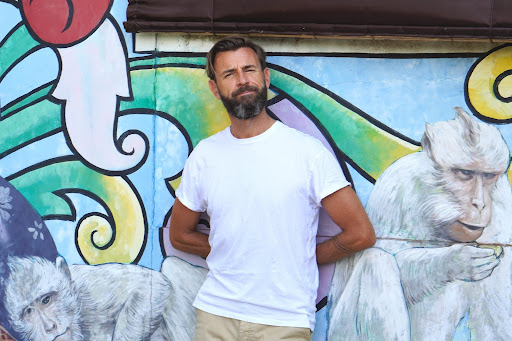
Some folks believe that long-lasting happiness is a myth — an impossibility since it cannot be maintained. For as long as can be remembered, humans have sought longlasting happiness while attempting to transform the collective's relationships with many facets of the human experience, including grief, acceptance, forgiveness, death and howtodiehappybook.com PRESS RELEASE Page 1 of 3 dying. These topics (and more) are profoundly explored in Martin O'Toole's ambitious new book, How To Die Happy: curated wisdom, stories, and utilities for the art of living.
"This madman has found a way to weave such wisdom into a tapestry of interconnected insight and understanding. The result is a charming and witty guide to attaining happiness that is both heartfelt and funny".
— Lee Holden, founder of Holden Qi Gong
Far from being a guru, coach, or PhD, Martin O'Toole is a "man on the mend", a regular recovered high-functioning alcoholic adman who left London to live a mindful life on the Indonesian island of Bali. With a material- and drama-obsessed past life and having narrowly avoided suicide (his beagle talked him out of it), O'Toole says suffering is by far the best teacher for anyone seeking a sustainably contented life. He credits the healing powers of the potent South American psychedelic medicine, Ayahuasca, for launching his phenomenal journey of personal transformation. This, combined with newfound Eastern philosophies and practices, has dramatically changed his perspective on dying, living, and being. In February, he celebrated his fifth year of sobriety, which is considered a controversial concept by many, given his integrated use of psychedelic therapies.

A recent report by the World Health Organisation (WHO) revealed that depression now affects approximately 280 million people worldwide, making it one of the leading causes of disability. The report also found that more than 700,000 people die from suicide every year, with many more attempting to take their own lives.
Disturbingly, suicide is the fourth leading cause of death among 15-29-year-olds, highlighting the urgent need for mental health interventions and support for this vulnerable age group. The American Association of Suicidology estimates that for every suicide, as many as 25 people attempt (and fail) to take their own lives. What's equally concerning, according to O'Toole, is that in a typical month, 677,000 people worldwide research "suicide" online. That number has increased by 13 per cent since 2019. Around 89,000 use specific terms, including "how to commit suicide" and "how to commit suicide painlessly". This purpose-driven (monthly) number has increased by a shocking 78 per cent since 2019. The US, India, the Philippines, the UK, and France rank high in the league table.
The WHO report also highlighted the impact of mental health conditions on physical health, with people who suffer from severe mental illnesses dying prematurely, up to two decades early, due to preventable physical conditions.
These findings underscore the importance of addressing mental health issues and providing accessible and practical mental health resources and support. As the global community works to address mental health challenges, these statistics serve as a call to action to prioritise mental health and suicide prevention efforts.
"Depression and suicide are pandemics apathetically accepted by the lion's share of society. I don't want that for my community — especially since there are myriad alternative ways to tackle these issues positively. Life brings pain — there's no getting around that. But our level of emotional suffering can be stemmed with practical mindfulness utilities. If we can learn these tools en masse, we can experience genuine and sustainable happiness".
— Martin O'Toole, author of How to Die Happy
Through his experiences of the "pointless pursuance of success", Martin uncovered "The Anatomy of Happy" — a process outlining the alchemy of everlasting happiness, which he says "anyone can follow", provided they're willing to work. Through understanding the depths of depression and contrasting heights of delight, he felt compelled to share his story, thus, aged 47, publishing this his first psycho-spiritual book, which he insists will not be his last.
Media Contact
Company Name: Martin O'Toole (author, How To Die Happy)
Contact Person: Julia Malcolmson
Email: Send Email
Country: Indonesia
Website: https://howtodiehappybook.com
